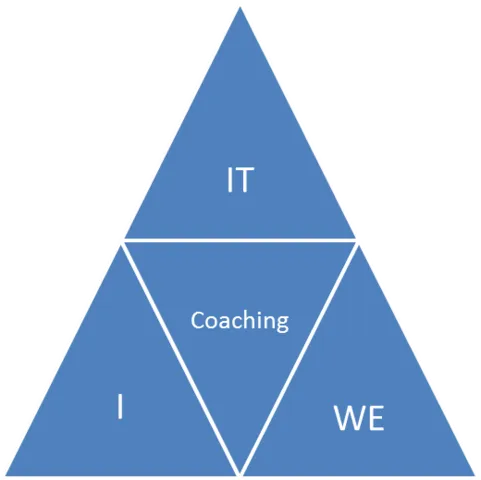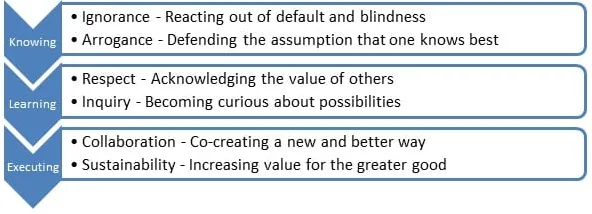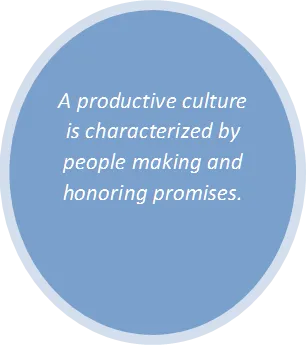Approach
We Co-Create
In partnership with you, we co-create a strategic leadership solution blending paradigm-shifting and skill-building workshops, coaching conversations to apply new skills to specific management and sales challenges, team meeting facilitation to reinforce the new way of operating, and senior executive strategic coaching to resolve higher level business issues.
We have worked with organizations from a variety of industries and across the globe. Understanding your situation is the first step in any of our engagements. We want to understand where you are now, where you want to go and why. We call this “the gap analysis.”
Through a thorough process of inquiry consisting of assessment tools, in-depth interviews and dialogue sessions, we identify the costly business challenges you face and the opportunities that would bring value to you, your stakeholders, and employees.
Our ICF-credentialed coaches meet the highest standards set by the International Coach Federation and we customize all interventions to meet specific client needs. We follow a collaborative, results-oriented and systematic process, based on cutting-edge research. We believe in learning through experience and promise to help you measure and track the value that is being created as a result of our work together.
Achieving and sustaining extraordinary business results requires an approach that leverages the intrinsic genius and motivation of people.
For more than ten years, Heads-Up Performance has helped clients navigate through difficult challenges by focusing on:
- Sustainable Performance Management
- Enhanced Leadership Capabilities
- Coaching Skills Development
- Conversations and Commitment Management
- Promised-Based Culture Change
- Foundation of Collaborative Teams: Ongoing Regard for Others and the Greater Good
Get Great at Managing Conversations
Results in an organization are directly related to the conversations people are having, not having or not having well. Conversations have the potential to produce commitments, which in turn shape actions and results. They are either informed by what people care about or they are not. They either produce satisfying results or they don’t.
When people in an organization are engaged in the wrong conversations or are avoiding difficult conversations the organization will experience breakdowns, dissatisfaction and a lack of trust.
Our aim is to look for the conversations that are missing or are being had ineffectively and replace them with effective conversations that are more likely to produce desired outcomes. For example, the presence of a lot of complaining at the watercooler is an indication that powerful conversations that would bring about an acceptable solution are either missing or haven’t produced the desired result.
In our coaching approach we help our clients identify their role in breakdowns and commit to a new way of communicating that enhances accountability while preserving relationships and trust. We believe that almost everything we want is available through conversations. We just need to identify what we want, with whom to have what conversation and then have it effectively.
Care and Concerns – We assume that each person goes to work for his or her own personal reasons. There is something this person cares about that determines his or her decision to act.
Conversations – As a result of that care, the person will engage in a series of conversations
Commitment – In order to get things done, the person will make or obtain a commitment to act
Action – The person acts according to the commitment that was made
Result – Based on the actions taken a particular outcome is created.
Create a High Performance Culture
Here are just four of the key benefits of a Commitment-based culture:
Learning Organization
With the rate of change in today's work world, becoming great at learning and adapting becomes a competitive advantage.
Psychological Safety
Research is showing that teams whose members feel safe to offer their real opinions out perform fear-based cultures.
Leaders Developing Leaders
The key to culture change is cascading high-performance leadership throughout the organization. We make leadership go viral.
Focus on Desired Outcome
Imagine putting a stop to the complaining and blaming and instead experience a relentless focus on solutions.
More on Our Approach Below
Sustainable Performance Management
We follow a systematic approach to enhancing the three domains of performance: intrapersonal (individual), interpersonal (relationships) and impersonal (tasks and results). How are the three connected and where do we put our emphasis?
All three domains are important and require attention. To produce desired results, we need effective teams, which need to consist of effective team members, who effectively coordinate action. Each level needs to be optimized within the context of the entire organization and its business objectives. The vehicle to accomplish that is coaching.
Enhance Emotional Skills
To build a culture where people seek to understand each other, build trust and collaboration and commit to producing strategic objectives, leaders need to develop a high degree of emotional intelligence and be aware of their own role in creating the current work culture.
They need to know themselves, understand how they are being perceived and realistically assess their impact. They need to inspire others to gain self-awareness, listening skills, and compassion and learn how to navigate through challenging times with integrity.
They also need to let go of what they think they already know and be open to new possibilities. Often leaders arrive at conclusions via unexamined thinking habits and don’t realize that they have a choice to generate more innovative perspectives. They hold deep-seated assumption about themselves and others that can get in the way of staying open to other options.
If leaders are not already self-aware, they must undergo a process of personal transformation in order to create organizations where people:
Listen to each other with curiosity, openness and non-judgment
Take responsibility for their thoughts, emotions, actions and results and don’t act like victims
Honor common human values and adhere to operational standards
Share their thoughts authentically and respectfully
Have difficult conversations with the “right” people in a timely manner
Manage commitments and act in integrity
Are skillful in identifying underlying issues, declaring breakdowns and managing emotions
Coaching Skills Development
Coaching skills are a leadership core competency and are fundamental to building trust and meaningful commitments on teams.
Unlike mentoring or consulting, coaching is not about providing answers and solutions. Coaching is a systematic conversation that leads to new perspectives, creative problem solving, and commitments that can be managed.
Based on the fact that most of us were raised to learn things and then demonstrate what we know rather than be curious about what we don’t know and listen to other peoples’ perspectives, the coaching conversation is counter-intuitive.
Collaborative Team Development
Teamwork: Ongoing Regard for Others and the Greater Good
Most people believe that when every element of a system performs at its best, the system performs at its best. This is not necessarily so.
The key is to harmonize the parts and their work together for the greater good.
Imagine your body. Let’s say a specific gland decides to pump out three times the testosterone your body needs, just because it can. How would you feel? What would it be like if the liver decided to do its cleaning during the day instead of while you sleep? It would pull several gallons of blood from the rest of your body, leaving your brain depleted of oxygen and nutrients when you most need your thinking capacity. When your body is out of balance (or harmony), it becomes counterproductive.
Organizations are no different from the body. Under economic pressures or when extreme circumstances push people beyond capacity, each person tends to revert back to practices that ensure his or her own well-being, safety and survival. When people become stressed they are typically blind to the impact their way of being or acting has on others, including the situations they find themselves in. In their blindness they often fail to see the need to learn a new way of responding to crisis, one that is coming from a more conscious place of choosing how to respond, rather than just react.
The key to optimizing and harmonizing performance is moving the organization through stages from:
Creating Commitment-Based Cultures
A productive work culture is one that is characterized by people making and honoring commitments. What does that mean? It means that leaders on all levels learn to make requests and obtain commitments that can be managed. They no longer manage people; they effectively coordinate action by managing peoples’ commitments.
The rigorous practice of “requests,” “commitments” and “complaints” creates an environment of integrity where things get done and people’s emotions enhance their performance rather than interfere with it. The foundational principles of this work are summarized in our book Who Will Do What by When?, which serves as a roadmap for operating in integrity to enhance performance, trust and organizational results. Similar to the benefits of upgrading your computer’s operating system, we work with you to enhance your team’s reliability, capacity and speed. The new “interpersonal operating system” provides a platform for sustained excellence.
Our clients who have transformed their culture typically say things like...
- We now use more coaching conversations to get things done
- We don’t whine, gossip or complain as much; we make requests and promises
- We don’t act like victims who react to circumstances anymore; we create solutions
- We identify and shift our moods and emotions in order to better function
- We are committed to a higher standard of integrity and act more consistently with our words
- We have a practice of establishing shared standards for satisfaction upfront instead of creating dissatisfaction
- We build trusting relationships in order to collaborate and get things done
- We choose to have powerful conversations that lead to action and results, even when they are uncomfortable





